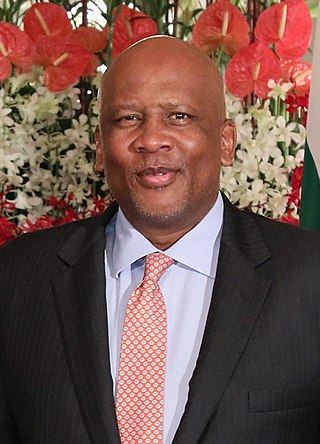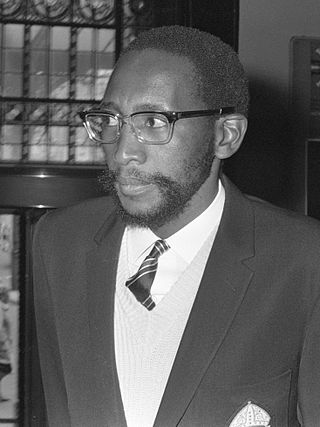Related Research Articles

Lesotho, formally the Kingdom of Lesotho, is a landlocked country in Southern Africa. As an enclave of South Africa, with which it shares a 1,106 km (687 mi) border, it is the largest sovereign enclave in the world, and the only one outside of the Italian Peninsula. It is situated in the Maloti Mountains and contains the highest peak in Southern Africa. It has an area of over 30,000 km2 (11,600 sq mi) and has a population of about two million. Its capital and largest city is Maseru. The country is also known by the nickname The Mountain Kingdom.

The history of people living in the area now known as Lesotho goes back as many as 400 years. Present Lesotho emerged as a single polity under King Moshoeshoe I in 1822. Under Moshoeshoe I, Basotho joined other clans in their struggle against the Lifaqane associated with famine and the reign of Shaka Zulu from 1818 to 1828.
In the United Kingdom and the British Overseas Territories, personal bravery, achievement, or service are rewarded with honours. The honours system consists of three types of award:

Military awards and decorations are distinctions given as a mark of honor for military heroism, meritorious or outstanding service or achievement. A decoration is often a medal consisting of a ribbon and a medallion.

Letsie III is King of Lesotho. He succeeded his father, Bereng Seeiso Moshoeshoe II, who was forced into exile in 1990. His father was briefly restored in 1995 but died in a car crash in early 1996, and Letsie became king again. As a constitutional monarch, most of King Letsie's duties as monarch of Lesotho are ceremonial. In 2000, he declared HIV/AIDS in Lesotho to be a natural disaster, prompting immediate national and international response to the epidemic.

Moshoeshoe II, previously known as Constantine Bereng Seeiso, was the Paramount Chief of Basutoland, succeeding paramount chief Seeiso from 1960 until the country gained full independence from Britain in 1966. He was King of Lesotho from 1966 until his exile in 1990, and from 1995 until his death in 1996.

The Sotho, also known as the Basotho, are a Sotho-Tswana ethnic group native to Southern Africa. They primarily inhabit the regions of Lesotho and South Africa.

Moshoeshoe I was the first king of Lesotho. He was the first son of Mokhachane, a minor chief of the Bamokoteli lineage, a branch of the Koena (crocodile) clan. In his youth, he helped his father gain power over some other smaller clans. At the age of 34 Moshoeshoe formed his own clan and became a chief. He and his followers settled at the Butha-Buthe Mountain. He became the first and longest-serving King of Lesotho in 1822.
To be mentioned in dispatches describes a member of the armed forces whose name appears in an official report written by a superior officer and sent to the high command, in which their gallant or meritorious action in the face of the enemy is described.

The Free State–Basotho Wars refers to a series of wars fought between King Moshoeshoe I, the ruler of the Basotho Kingdom, and white settlers, in what is now known as the Free State. These can be divided into the Senekal's War of 1858, the Seqiti War in 1865−1866 and the Third Basotho War in 1867−68.
Major-General Elias Phisoana Ramaema was Chairman of the Military Council and Council of Ministers of Lesotho from 2 May 1991 to 2 April 1993.
South African orders, decorations and medals are those military and civilian orders, decorations and medals issued by the Government of South Africa. The following is a (non-exhaustive) list of these:
The South African honours system consists of orders, decorations, and medals which are conferred on citizens, and others, to recognise a range of services and achievements. The system has developed since 1894.
In the Democratic Socialist Republic of Sri Lanka, individuals are recognized for personal bravery, achievement, or service with the with national honours. The national honours consists of several types of awards:
Portugal has a system of orders, decorations, and medals as a means of honouring individuals for personal bravery, achievement, or service to Portugal.
The Honorary Medal for Charitable Assistance was created at 18 June 1822 and is after the Military William Order the oldest decoration for bravery in the Kingdom of the Netherlands. Furthermore, the Honorary Medal is the highest civilian decoration still being awarded for bravery, and is specifically for those who carried out a voluntary act of bravery or self-sacrifice, with an emphasis on charity.
The Orders, decorations, and medals of Guyana were established after Guyana gained independence from the United Kingdom. In 1970 Guyana became a Republic and established its first two national awards under the Constitution of the Orders of Guyana. In 1976, the Constitution of the Orders of Guyana was amended to add a third national award.

The Honoris Crux of 1975, post-nominal letters HC, is a military decoration for bravery which was instituted by the Republic of South Africa on 1 July 1975. The decoration was awarded to members of the South African Defence Force for bravery in dangerous circumstances. It was the junior in a set of four Honoris Crux decorations in four classes, which together replaced the discontinued Honoris Crux of 1952.

'Mantsopa Anna Makhetha (1793–1908), often referred to as 'Mantsopa, was a Basotho prophetess, rainmaker, and storyteller. She advised King Moshoeshoe I and predicted the outcomes of several battles, including the Battle of Viervoet in 1851 and the Battle of Berea in 1852. She was exiled to Modderpoort in the late 1860s, where she converted to Christianity and was baptised in 1870. She fused Christianity with her own traditional Basotho customs.
References
- ↑ "Lesotho: Order of Achievement". Gentleman's Military Interest Club. 29 June 2007. Retrieved 30 July 2023.
- 1 2 3 4 "Kingdom of Lesotho" . Retrieved 8 March 2018.
- ↑ "A tribute to Justice Jan Hendrik Steyn" . journals.co.za. Retrieved 15 September 2023.
- ↑ Cambridge University Press
- ↑ A Century of Mission Work in Basutoland